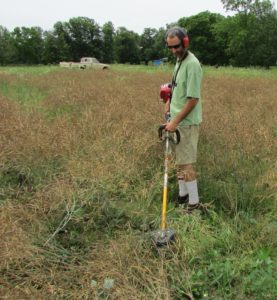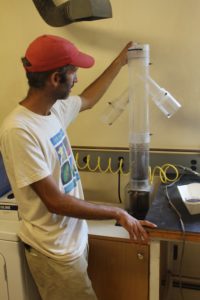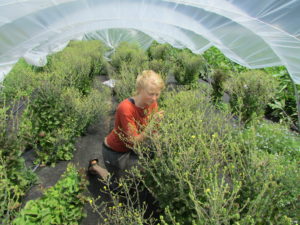Fruition Seeds: A Model for Collaborative, Regional Seed Development

Matthew cutting kale seed. All photos by Petra Page-Mann
With over thirty years of combined agricultural experience, Matthew Goldfarb and Petra Page-Mann co-founded Fruition Seeds in 2012 to improve and develop our regional genetic resources. Currently growing over sixty seed crops on three acres in the heart of the Finger Lakes of New York, they are dedicated to organic, open-pollinated and regionally adapted seed grown in and for Northeast farms and gardens. They currently sell seed through their website, fruitionseeds.com, and select retail locations while offering workshops throughout the Northeast on the significance and techniques of seed saving. Fun how-to videos on seed saving can be found on their Facebook page as well.
Petra has worked for seed companies large and small on both coasts, saving her first seeds as a child. Matthew has farmed across the country at all levels of management, from apprentice to executive director. Establishing Fruition Seeds in Petra’s hometown, the couple is putting together their extensive collective experience to build their seed company.
The significance of farming in Petra’s hometown should not be underestimated; relationships and opportunities offered by familiar, committed communities are extensive. From finding land to sharing equipment, from amassing organic matter to simply eating a cooked meal every night, the benefits of beginning a farm where one’s roots are deep are innumerable. Even on their back road, friends stop by all the time, often with pitchers of lemonade in hand. As a seed operation, there is much abundance that is “by-product” (with thousands of ripe tomatoes, all Matthew and Petra need is the seed!), and becomes a tremendous gift back to the community.
The foundation of a resilient regional food system is quality, well-adapted and diverse genetics. As much about cooperative efforts as it is about seed saving, this work cannot be done alone.
Fruition Seeds collaborates extensively, always building connections and opportunities. The original vision was quite insular: in response to a seed industry focused on ‘wide’ adaptation and broad distribution, a company committed to ‘regional’ adaptation selling only its own seed seemed compelling. However, as the couple explored the models and values most central to their lives, they found the strength and capacity of collaboration to be a more appropriate response for their vision.
This collaborative approach informs every decision made by Fruition Seeds. From the two farms they lease to resources accessed within academic, extension, for-profit and non-profit spheres, so much of what the couple has accomplished is a result of collaboration in one form or another.
Relationships with fellow growers of high-quality, certified organic seed in the Northeast are central to their vision. For example, collaborating with Nathaniel Thompson to grow seed on Remembrance Farm in Trumansburg, New York is a highlight of their organic, farm-based, open-pollinated genetics development.
Thompson is a commensurate collaborator, building cooperative CSA models and organizing extensive community equipment sharing while producing dozens of acres of biodynamic field greens. Aware of the significance of seed both economically and ecologically, Thompson is invested in developing genetics suited to his operation. In collaboration with Fruition Seeds he has planted two acres of crops for seed.
Thompson takes responsibility for soil fertility, planting and cultivation while Fruition Seeds makes selections, harvests and cleans the seed. The seeds are then divided, fulfilling Thompson’s seed needs for the following season while the remainder is sold through Fruition Seeds. These large-scale grow-outs make significant improvements in varietal characteristics. In 2013, they grew ⅓ of an acre of red Russian kale, making selections for over-wintering, uniformity, vigorous spring regrowth and disease resistance, roguing out thousands of plants in the process.

Matthew cleaning tatsoi seed.
This relationship is pushing boundaries and creating opportunities, developing systems to grow seed on large scales for the Northeast. Already some significant breakthroughs have been made, many unintentionally. For instance, when they began connecting in mid-winter, Thompson had a number of crops overwintering in the field that had been planted for greens but not yet harvested. Among other crops expected to survive (kale and Asian greens), several lettuces regrew in the spring, were selected and indeed produced quality seed in the open field remarkably adapted to Thompson’s soils, climate and production style. Growing overwintered lettuce for seed in the field in the Northeast at farm-scale is a remarkable discovery and further experiments are well underway for 2014.
Fruition Seeds is developing systems of producing seed here in the Northeast even for crops not generally produced here, like lettuce. Another crop that is challenging to grow in the Northeast, on any scale, is carrots. Dry-seeded biennials that cross with Queen Anne’s Lace up to a mile, carrots and their production have moved to the arid Pacific Northwest for a reason. However, consider the variety of carrot ‘scarlet nantes,’ developed in a cool, wet region of France before they could outsource production to the Willamette Valley. It is possible to grow quality seed for quality food in any bioregion; the limit is our collective, collaborative imagination.
Petra and Matthew have countless mentors in the seed industry as they’ve built Fruition Seeds; here are a few and their impact on the couple.
Brian and Chrystine of Uprising Seeds in Washington have demonstrated the importance of designing a business around their lives and not their lives around a business. Don Tipping of Siskiyou Seeds in Oregon has shown the significance of, on all levels, keeping it local. Tom Stearns of High Mowing Seeds in Vermont taught the necessity of talking with everyone as well as focusing on growing, selecting and breeding the very best seed. Frank Morton of Wild Garden Seeds in Oregon has modeled excellent seed selection and variety development within the context of market gardening. David Greenburg of Abundant Acres in Nova Scotia offered the invaluable and constant mantra, ‘do you want to weed vegetables or breed vegetables?’ Neither last nor least, Will Bonsall of the Scatterseed Project in Maine taught them to sing songs and ‘let nature happen.’
Fruition Seeds loves the work they do and the people they work with. Their biggest challenge is growing at a rate that doesn’t compromise seed quality as they expand available quantity. They look forward to growing in collaboration the highest quality organic, open-pollinated and regionally adapted seed in and for the Northeast. Please send them any questions or comments about seed and seed saving in the Northeast.


